Are your Calathea Leaves Turning Brown and Yellow? Or you’re worried about Calathea Brown Edges? Here are all the details to solve these issues!
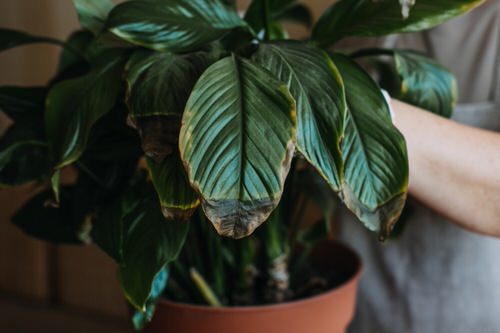
Calatheas can make it challenging to keep their pretty foliage in incredible condition all the time. Most gardeners worry about Calathea Leaves Turning Brown and Yellow, and some even call it finicky due to Calathea Brown Edges, if you too have this problem, this post is useful for you.
Have a look at the best Calatheas here
Calathea Leaves Turning Brown and Yellow – Reasons and Solutions
1. Lack of Humidity
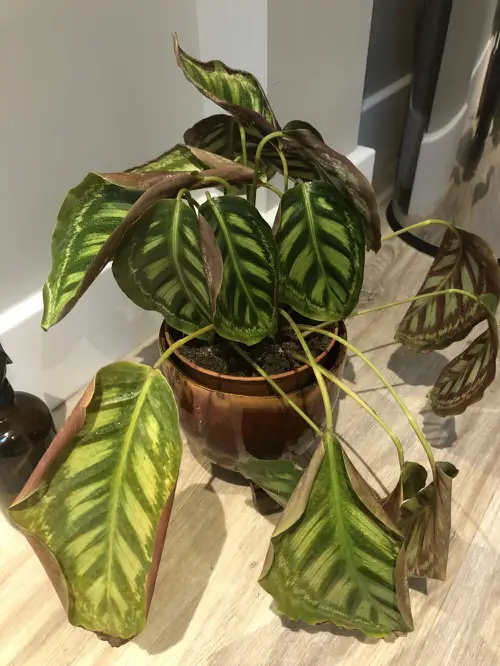
The number one reason behind Calathea’s Leaves Turning Brown & Yellow is the lack of humidity. Calatheas love humid air, and if that is what the plant is not receiving, it might develop brown spots or turn the leaves into brown and yellow. Calathea leaf curling is also one of its symptoms.
How to Solve the Issue?
- Place a humidifier near the plant to keep the air moist.
- You can mist the plant often, but it is not that effective.
- Place your Calatheas in a spot like a kitchen or a bathroom as they are less drier.
- Keep the pot on a tray filled with pebbles and water.
- Keep it in a mini greenhouse
2. Incorrect Light Exposure
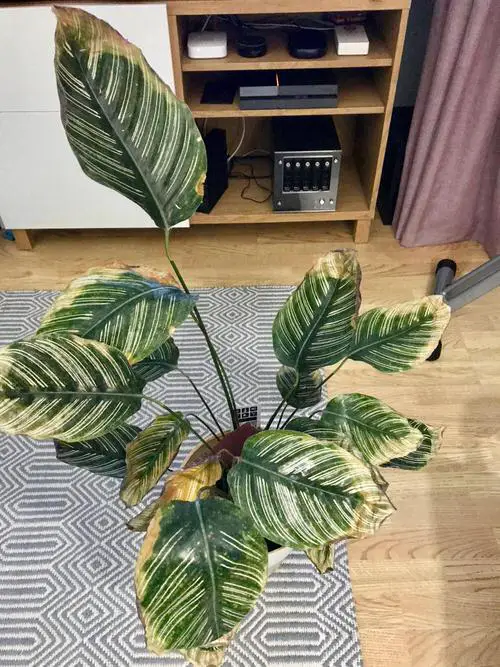
For best growth, calatheas require bright but indirect sunlight to thrive well. The first thing you may need to check is if the plant is receiving an incorrect amount of lighting.
It should not be placed directly under grow lights or in front of a sunny window as it will burn the foliage.
How to Solve the Issue?
- Keep the plant at a location where it gets plenty of indirect light throughout the day.
- The plant won’t mind 2-3 hours or direct exposure to the mild sun.
- Do not keep the plant in direct sunlight.
3. Water Quality
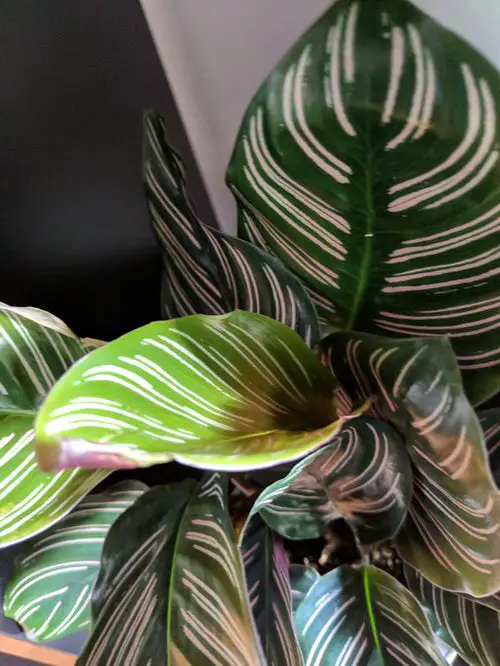
Along with watering requirements, water quality can also cause the calathea leaves to turn brown and yellow. In their native environment of rainforests of Southeast Asia and South America, these plants go well in rainwater devoid of hard minerals, salt, chlorine, and fluoride.
How to Solve the Issue?
- Use rain, well, RO, and stream water to keep your Calatheas healthy and happy.
- Alternatively, leave the water to sit overnight to let the salts and fluoride settle down.
4. Overfertilization
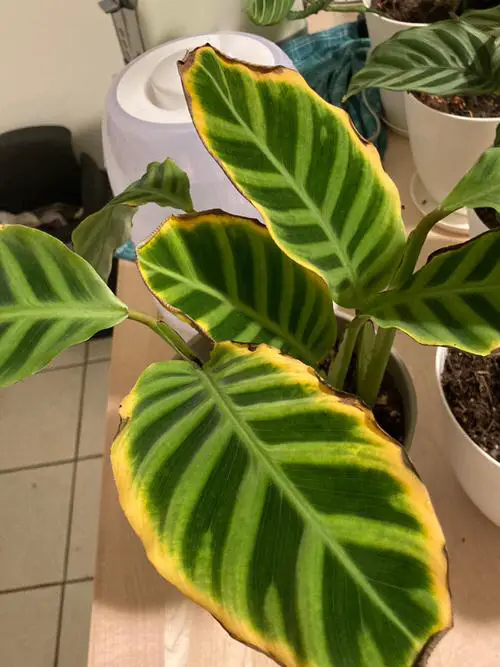
Feeding the plant more than needed can make the edges yellow and brown. If you are fertlizing it too frequently, then it can also kill it.
How to Solve the Issue?
- Use a balanced fertilizer, diluted to 1/4 of its strength, once in 3-4 weeks during the growing period.
- Do not feed the plant in winters as it does not actively grow during that period of time. The excess nutrients will do more harm than good.
Calatheas prefer little loamy and crumbly soil with organic matter, just like in their native environment of the rainforest. If the soil is consistently dry and too compact, it can cause the browning or yellowing of the leaves.
5. Exposing the Plant to Cold Temperature
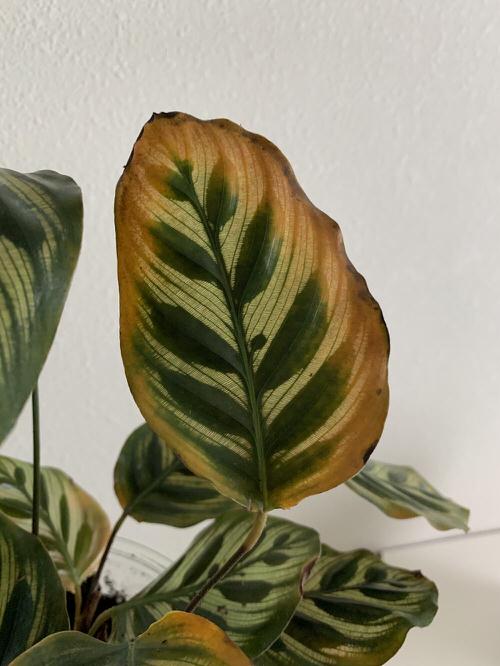
Calatheas, being tropical plants, are not fond of cold weather, and exposing them to lower temperatures will make their leaves either yellow or brown while making them less vibrant.
How to Solve the Issue?
- The plant prefers a pleasantly warm climate, and the suitable temperature range is between 65-85°F or 18-30°C.
- Do not keep the plant too close to a window where its leaves touch the windowpane.
- Keep it away from A/C and heating vents.
- Do not expose the plant to a temperature below 60°F or 15°C to avoid any cold damage.
6. Underwatering
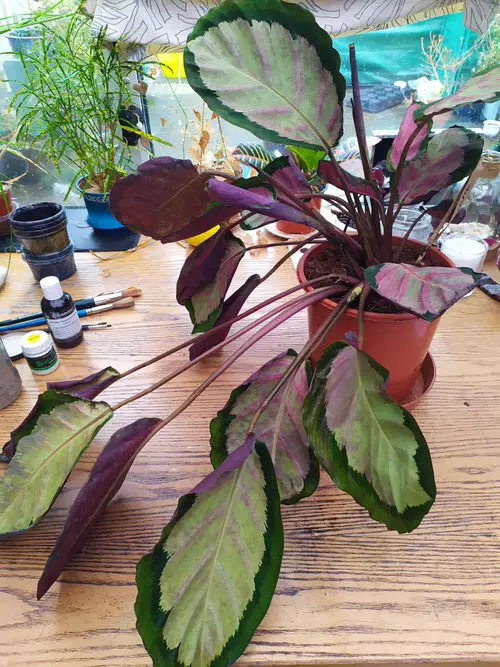
If you are not watering your calathea enough, it will drop and start showing yellow or brown foliage. You may also notice the leaves beginning to look droopy or curl up.
How to Solve the Issue?
- Run a topsoil test once in 3-4 days to see if it’s dry to touch. If it is, water the plant.
- Water the plant deeply till it starts to come out from the drainage hole.
7. Overwatering
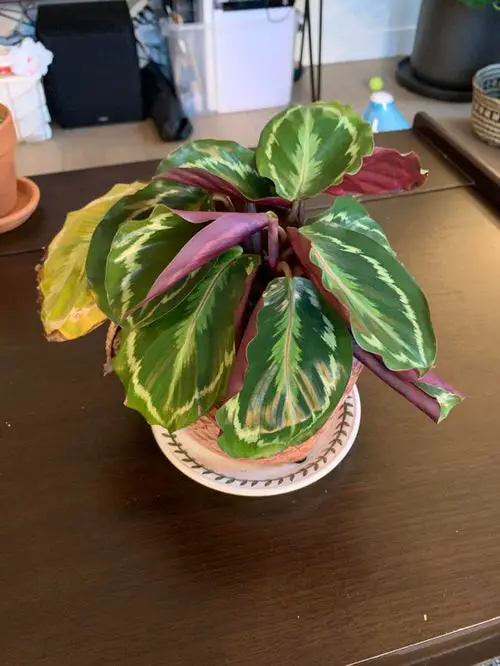
If you are overwatering your Calatheas, the yellowing or browning of leaves will soon start to take place.
How to Solve the Issue?
- Cut down the watering to once or twice a week.
- Do the topsoil finger test before watering the plant.
- If the foliage is soft and damaged too much, then it would be a good idea to gently remove the plant from its present container and re-pot it into a fresh potting mix in a new container. Do snip away damaged and rotten roots while doing so. Also, check out these overwatering tips!
8. Pests
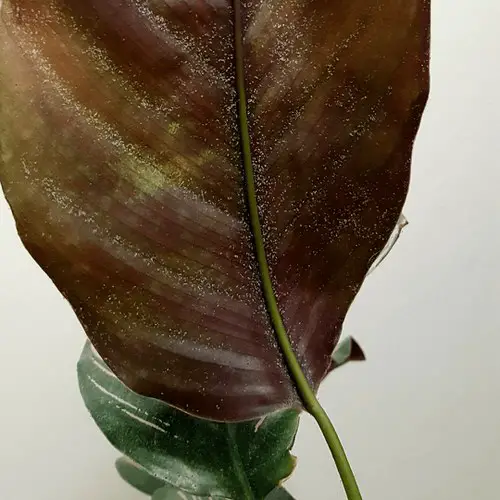
It is essential to check for pest trouble if all other reasons do not seem to fit in behind the yellowing or browning of the leaves. Pests can cause the yellowing of leaves, too, as they can damage the plant by sucking out the nutrients.
How to Solve the Issue?
- Turn the leaves and check the underside, if needed.
- Clean up your plant if you notice any webbing, movement, silver streaks, or black pest poops, using a cotton cloth dipped with an insecticidal soap solution.
- If there is too much infestation on a certain leaf, snip it away to stop the spread on the entire plant.
What to do with Brown or Yellow leaves on Calatheas?
If you notice these unsightly brown and yellow spots on your Calatheas, it may be the time to give them a nice trim.
- Get rid of all the brown leaves as they will never go back to being green again.
- Cut off all the affected parts using sharp and clean pruning shears or scissors.
- Cut the plant in phases because it is not a great idea to get rid of more than 20 percent of the affected parts in one go. It can cause shock or stress to your plant.
Get the best tips to grow Hostas plants indoors here!



Thank you so much for this information. Mine are in dire straights and this is exactly what I needed to keep them alive. Thanks again 😀
Very pleased to get such good information on care for my Calathea plant which i purchased at Christmas
Just love it
Thank you
AOS